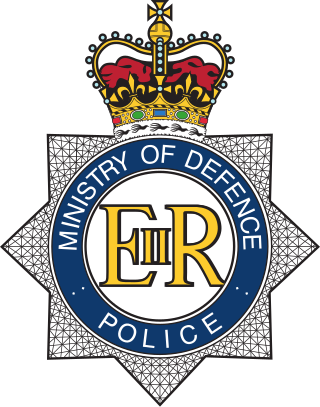
Civil defense or civil protection is an effort to protect the citizens of a state from human-made and natural disasters. It uses the principles of emergency operations: prevention, mitigation, preparation, response, or emergency evacuation and recovery. Programs of this sort were initially discussed at least as early as the 1920s and were implemented in some countries during the 1930s as the threat of war and aerial bombardment grew. Civil-defense structures became widespread after authorities recognised the threats posed by nuclear weapons.

The British Armed Forces, formally known as His Majesty's Armed Forces, are the military forces responsible for the defence of the United Kingdom, its Overseas Territories and the Crown Dependencies. They also promote the UK's wider interests, support international peacekeeping efforts and provide humanitarian aid.

The Green Goddess is the colloquial name for the RLHZ Self Propelled Pump manufactured by Bedford Vehicles, a fire engine used originally by the Auxiliary Fire Service (AFS), and latterly held in reserve by the Home Office until 2004, and available when required to deal with exceptional events, including being operated by the British Armed Forces during fire-fighters’ strikes. These green-painted vehicles were built between 1953 and 1956 for the AFS. The design was based on a Bedford RL series British military truck.
Aid to the Civil Power (ACP) or Military Aid to the Civil Power (MACP) is the use of the armed forces in support of the civil authorities of a state. Different countries have varying policies regarding the relationship between their military and civil authorities.
Military aid to the civil community (MACC) is a phrase referring to the armed forces providing a service to the civilian community. It is used in many countries, particularly the United Kingdom.

The Ministry of Defence is the department responsible for implementing the defence policy set by His Majesty's Government, and is the headquarters of the British Armed Forces.

Defence Intelligence (DI) is an organisation within the United Kingdom intelligence community which focuses on gathering and analysing military intelligence. It differs from the UK's intelligence agencies in that it is an integral part of a government department – the Ministry of Defence (MoD) – rather than a stand-alone organisation. The organisation employs a mixture of civilian and military staff and is funded within the UK's defence budget. The organisation was formerly known as the Defence Intelligence Staff (DIS), but changed its name in 2009.

The Defence Forces are the armed forces of Ireland. They encompass the Army, Air Corps, Naval Service, and Reserve Defence Forces.

The Civil Contingencies Act 2004 is an Act of the Parliament of the United Kingdom that makes provision about civil contingencies. It also replaces former Civil Defence and Emergency Powers legislation of the 20th century.

The Ministry of Defence Police and Guarding Agency (MDPGA) was an organisation within the United Kingdom's Ministry of Defence between 2004 and 2013.
Defence Information Infrastructure (DII) is a secure military network owned by the United Kingdom's Ministry of Defence MOD. It is used by all branches of the armed forces, including the Royal Navy, British Army and Royal Air Force as well as MOD civil servants. It reaches to deployed bases and ships at sea, but not to aircraft in flight.
As firefighting has a rich history throughout the world, traditions in this profession vary widely from country to country.

Home Command, previously Personnel and Support Command, is a personnel support and UK operations command of the British Army. The post of Commander PSC previously replaced that of Adjutant-General to the Forces, and then had British Isles responsibilities, including Support Command and civil contingencies tasks, added to it.

The fire services in the United Kingdom operate under separate legislative and administrative arrangements in England and Wales, Northern Ireland, and Scotland.

The Kosovo Security Force is the military of Kosovo. KSF is tasked with defending the sovereignty and territorial integrity of Kosovo, military support for civil authorities, and participation in international peacekeeping missions and operations. Since 2018, it is in the process of transforming into the Kosovo Armed Forces, a process that is expected to finish in 2028.

The Ministry of Defence Police (MDP) is a civilian special police force which is part of the United Kingdom's Ministry of Defence. The MDP's primary responsibilities are to provide armed security and counter terrorism services to designated high-risk areas, as well as uniformed policing and limited investigative services to Ministry of Defence property, personnel, and installations throughout the United Kingdom. The MDP are not military police and should not be confused with the Royal Military Police or any other British Service Police. Service personnel often refer to the MDP by the nickname "MOD plod".
Many countries around the world have civil defense organizations dedicated to protecting civilians from military attacks and providing rescue services after widespread disasters. In most countries, civil defense is a government-managed and often volunteer-staffed organization.
Operation Temperer is a British government plan to deploy troops to support and free up police officers in key locations following a major terrorist attack or major public disorder. It was put into effect for the first time on 22 May 2017 following the bombing of an Ariana Grande concert at Manchester Arena and for a second time following the Parsons Green bombing.

Operation Rescript was the code name for the British military operation to help tackle the COVID-19 pandemic in the United Kingdom and its Crown Dependencies between 2020 and 2022. It was described as the UK's "biggest ever homeland military operation in peacetime" by the Ministry of Defence (MOD), involving up to 23,000 personnel within a specialist task force, named the COVID Support Force (CSF). The support was given at the request of the UK government, its devolved administrations and civil authorities through the Military aid to the civil authorities (MACA) mechanism.













